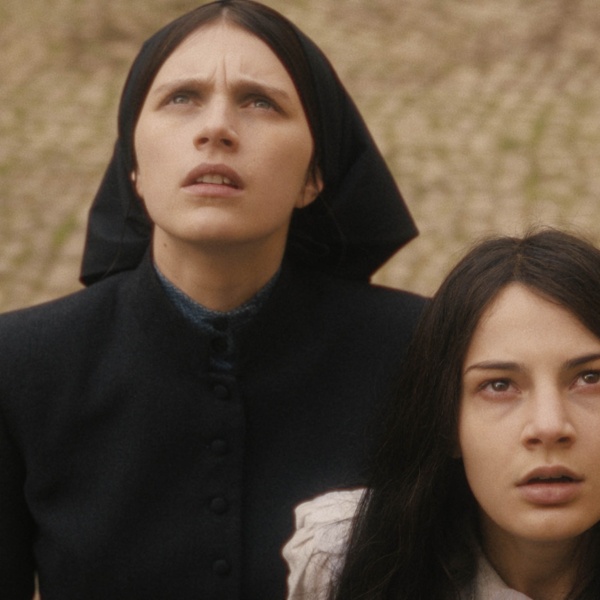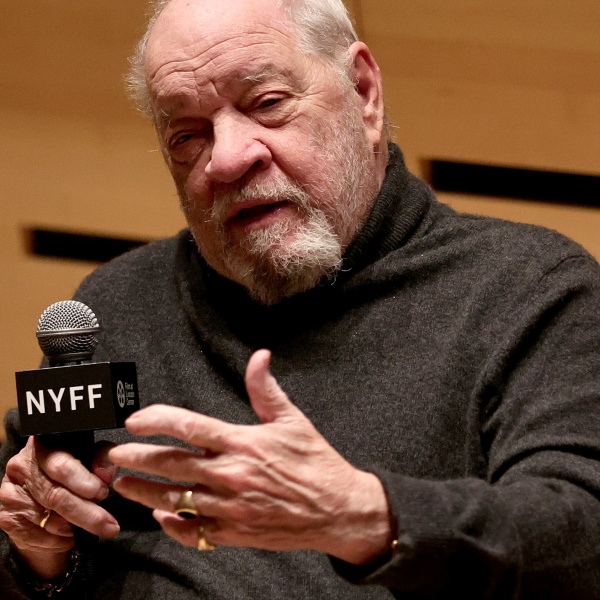A post-ironic picaresque born from a take-no-prisoners attitude so oppressive that it soon becomes its own kind of jail, Sean Price Williams’ “The Sweet East” amounts to something more than just a series of semi-connected trolls. But this sniveling little satire of modern American thought is never funnier or more sure of itself than when it makes you feel like an asshole for taking it too seriously.
Consider the film’s opening few minutes, which appear to tee up a lo-fi but legibly familiar sex comedy set on a high school trip to Washington, D.C., until things, uh, take a turn. We first meet Lillian (“Never Rarely Sometimes Always” breakout Talia Ryder, perfectly nonplussed) as she lies in a hotel bed next to a blond mouth-breather who plays with his used condom like it’s a party balloon and brags about how he’s going to be a star. Later, after reuniting with the rest of her grade, Lillian and her classmates run amok down the hallway, fuck around on the bus, and pose in front of the Capitol Building for a shot that ignores the architecture of American democracy to instead lavish attention on their asses instead.
Williams is an acclaimed cinematographer whose free-range, scuzz-core aesthetic has become synonymous with several of the most bitter and/or feral independent films of the last 15 years (e.g., “Frownland,” “Heaven Knows What,” anything directed by “The Sweet East” producer Alex Ross Perry), but if you didn’t know any better, you could almost be fooled into thinking that his directorial debut might owe more to Richard Linklater than the Safdie brothers. But then, as the opening credits roll over Lillian singing a lovely Paul Grimstad original to her own reflection in the bathroom mirror of a D.C. bar and restaurant, well… there’s really no other way to put this: Pizzagate happens.
More specifically, a gun-toting conspiracy theorist played by MTV-era icon Andy Milonakis storms in and demands to be shown the pedophile ring that’s being run out of the basement. In real life, it’s the stuff of modern American myth, but in the bizarro world of “The Sweet East,” every liberal punchline is taken at face value, and every morsel of progressive logic is treated like a joke. Not only is there actually a pedophile ring underneath the restaurant, but the glitter-punk freegan activist who helps Lillian flee the scene observes that it “seemed so much bigger when I was a kid.”
Having forgotten her iPhone in the bathroom, our heroine leaves her life behind along with it, surrendering herself to the pre-digital rhythms of a road comedy in which each sequence and subculture is almost completely disconnected from the others, but all are equally embarrassing. The Eastern seaboard is the only thing this shit-eating movie allows itself to love unironically, and Lillian bounces around it like a wayward Lolita or the disaffected angel of death. Allusions abound, but “EO” feels like a particularly apt — if entirely accidental — point of reference for this film’s episodic structure; just imagine if the donkey were the only character who wasn’t destined for the slaughterhouse.
Textured with Williams’ usual grain and kept alive by his keen eye for detail, “The Sweet East” essentially sees America as a series of concentric cults. Lillian is like a teenage Virgil leading us on a tour through some kind of stupid new hell where anyone who believes in anything does so with an all-defining religiosity that demands to be mocked.
What little generosity of spirit the film has to spare is saved for its most odious characters, like the crypto-fascist college professor played by Simon Rex (incredible, hilarious). He invites Lillian to stay with him after they cross paths at a Nazi rally, and this self-tortured Humbert Humbert soon becomes the most endearing character in the movie despite his swastika bedspread and penchant for muttering Edgar Allan Poe as a come-on. Aside from the raging anti-Semitism, he seems like a pretty decent guy!
Lillian doesn’t seem to have much of a moral compass, but identifying that strongly with anything bigger than yourself — good, evil, or anywhere in between — is so cringe that she has to move on the first chance she gets. It helps that everyone she meets believes in her at first sight. Everyone sees her as the perfect screen on which to project their own narrow view of the world. That’s true of the self-obsessed filmmakers who “discover” Lillian on the street (they’re played by Ayo Edebiri and Jeremy O. Harris, both very funny as hyper-talkative artists who assume that everyone sees the genius of their inane period piece). It’s true of the hunky movie star who turns her into the paparazzi’s latest cause célèbre (Jacob Elordi), and it’s true of the set PA Mohammed (Rish Shah), who’s convinced that he alone can “save” her.
For her part, Lillian is happy to adopt a different identity at the start of each chapter; the ferocious bite of Ryder’s shark-like performance is further deepened by the sharpness of her cheekbones, which are so high and angular that each new persona looks good on Lillian even as they slide off her face like an oversized mask. She always was something, she never is something, and the movie around her seems unsure if that’s sustainable. On the one hand, Lillian is the only character who avoids the embarrassment that naturally attends sincerity, and there’s a palpable degree of wish fulfillment baked into a character who so convincingly doesn’t give a shit (even though everyone is obsessed with her). To paraphrase one of the people she encounters, Lillian is Teflon enough to defy a digital culture that force-feeds her a series of unworthy choices, and she emerges from every encounter unscathed… whereas other characters are liable to get their heads blown off. In a film that adopts a “South Park”-like approach to making fun of everyone, Lillian is never the butt of the joke.
On the other hand, there are a few fleeting moments in which “The Sweet East” confronts its heroine with something approaching self-awareness. Her wanton use of the word “retarded” — a slur that the Dimes Square crowd embarrassingly tried to reclaim as an expression of their freedom from liberal moralizing — feels at first like an unfortunate side effect of a movie that allegedly features appearances from Peter Vack and Betsey Brown (their names appear in the credits, but I never clocked them on screen). Later, however, someone coolly confronts Lillian about that habit, leaving her at a total loss for words. When another character snipes that they “don’t like being told things about myself,” it almost sounds like the movie is admitting to a posture of its own — that it’s recognizing that lack of belief as a belief system unto itself.
It would be easier to buy any of that if “The Sweet East” didn’t begin to scramble as soon as it felt itself in the crosshairs, but the anarchic energy of its first half gives way to diminishing returns down the home stretch; the big swings become more labored, and the small eye-pokes become duller at much the same pace (it’s hard to top the weird DJ dick monsters who pop up about halfway through). “EVERYTHING WILL HAPPEN,” a semi-accurate title card screams at the very end of the film, but precious little of it will matter. Williams’ film knows that, and owns it, and shoves it in your face until the very last frame, as if letting it go would be akin to surrendering the high ground of its own superiority. That’s the one thing “The Sweet East” can’t really afford to do. This is a fun — and sometimes very funny — movie that is virtually impossible to make fun of in return, and at the end of the day, that might be the only metric of success that matters to it.
Grade: B-
“The Sweet East” premiered at the 2023 Cannes Film Festival. It is currently seeking U.S. distribution.






